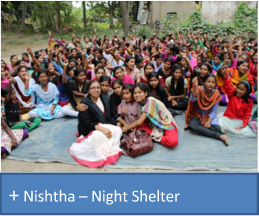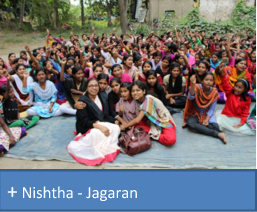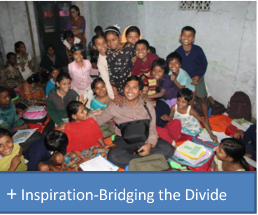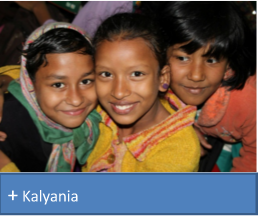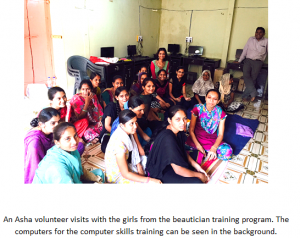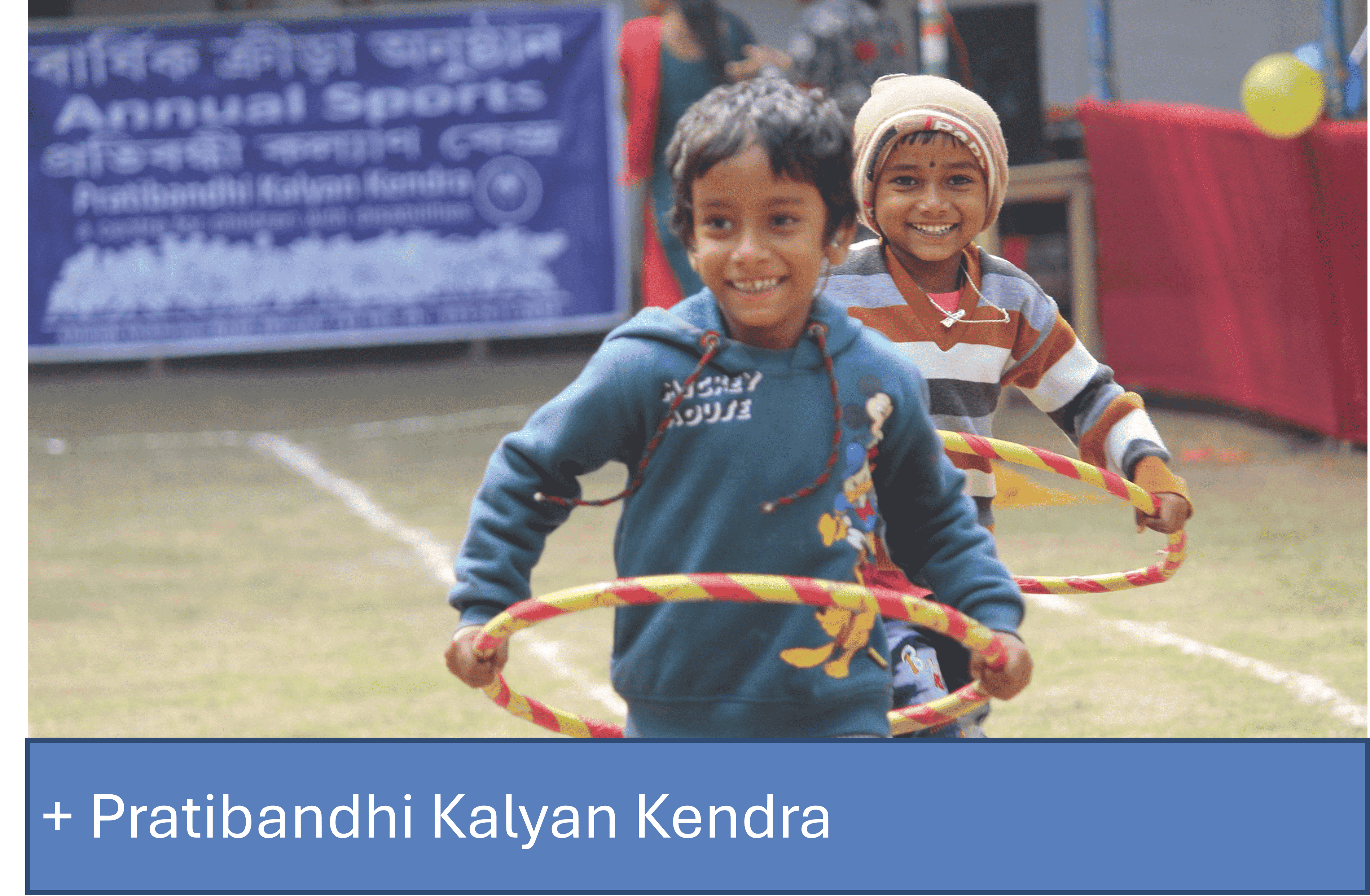Nishtha is providing alternative education to children of sex workers. The aim of this project is to financially support their infrastructure.
Click here to become a sponsor!
BACKGROUND:
- Extreme poverty and starvation forces women to take up prostitution. The women lack basic human rights.
- Children born to sex workers grow up amidst the poverty, squalor and crime in the brothels. Most do not go to school.
- Children are all malnourished and physically and sexually abused frequently by the clients. They are exposed to crime, alcohol and drugs at a very early age.
- Significant majority of boys succumb to a life of crime. Almost 100% of the girls take up prostitution or are kidnapped and forced into prostitution.
ACTION:
- NISHTHA with support from Asha for Education, Atlanta Chapter started a night shelter in September 2006 for the children of the sex workers. Shelter remains open seven days of the week.
- 32 children of ages 2 to 14 years live in the shelter. The shelter provides safety and emotional support. Nutritional support, clothing and recreational activities are also provided.
- The children are enrolled into formal schools through the help of Nishtha. Non formal teaching is provided to children who are unable to be accepted into formal schools.
CHALLENGES:
- Overcoming prejudice and stigma from the local population and ensure integration of children into mainstream society.
- Minimize dropout rate from schools and night shelter by providing education and emotional support to the children.
- Empowerment of mothers to minimize prostitution
This project is to support Jagaran, an effort led by Nishtha to provide access of education to kids at risk from 4 villages in south 24 paraganas, West Bengal.
Click here to become a sponsor!
BACKGROUND:
- Agriculture (a primarily male-dominated vocation) is the primary source of income for the villages in South 24 Parganas district in West Bengal, the sixth most populous district in India. Baruipur is the district headquarters (~30 Km from Kolkata).
- Women and children of these villages are economically deprived and vulnerable due to the lack of opportunities for self-empowerment and employment outside of agriculture.
- Girls are treated as a burden and not allowed to study beyond puberty. Female child marriage is extremely rampant with most marriages performed in secret with the girl and her mother having absolutely no say in the decision
- Domestic abuse (physical, mental and sexual) is very rampant with most families accepting abuse as a way of life. West Bengal being a border state with significant trafficking of minors across the border, many girls are also sold into the sex trade by their husband and in-laws for money.
ACTION:
Since the seventies, Nishtha has been working with women and children in more than 300 villages in the South 24 Parganas district to educate young girls. Nishtha organizes numerous educational and empowerment coaching programs to provide the necessary age-appropriate gender equality and empowerment training.
- Girls’ and boys’ groups – Balika and Balak Bahinis
- Adolescent girls’ and boys’ groups – Kishori and Kishor Bahinis
- Adult women’s groups – Mahila Mandals
CHALLENGES:
- Education, self-defense and empowerment support and vocational training must be continued relentlessly to minimize child marriage.
- Additional counselling and support must be provided to ensure successful job placement of the girls who underwent Spoken English and Computer Certification.
This project is to support Community based Accelerated Reading and Bridge Course Programme with a special focus on mainstreaming children at risk.
Click here to become a sponsor!
BACKGROUND:
Inspiration was formed in 1996 by IIT Kharagpur alumni to provide bridge training programs to children on migrant workers to help their integration into mainstream schools. Since 2010, Asha Atlanta has supported such bridge programs for more than 100 children of Kamarhati township of North 24 Paraganas district, West Bengal. Most of the funds each year are raised through
Asha’s Support a Child program with help from generous donors like you.
ACTION:
Asha Atlanta through the support a child program provides funds to run tuition classes, teacher salaries, books, stationary and snacks for children in four slums. The classes are vital to ensure that the children obtain the necessary support to maintain their grades and in be reenrolled into formal schools in the case of school dropouts.
CHALLENGES:
Migration of the parents and extreme poverty of the families is a major source of continued high school dropout rates. Counseling of the parents combined with sustained support from Asha is vital to ensuring that the children stay in school and enter either into college or some kind of vocational training that will help them get jobs
This project is to support a prayas center for special education and vocational training.
Click here to become a sponsor!
BACKGROUND:
Kalyania started with a primary focus on health care, attending to the senior citizens and
subsequently took on the education for underprivileged children. Kalyania Society was
established in 1998 by a group of Doctors, University Professors and Retired Executives with the objective of providing help to those who need them most.
ACTION:
- Generating health care through women empowerment and providing avenues for earning through vocational training in the form of Sevika training and Home
- Nursing training centers.
- Holistic education for the children of the deprived and the downtrodden by establishing Suhasini Sishu Niketan, a primary school.
Gram Vikas Trust (GVT) is a voluntary organization working for the education, health and women’s empowerment in the underprivileged communities, especially with children and women.
Click here to become a sponsor!
BACKGROUND:
Vagra is a sub-district of Bharuch, Gujarat and contains 73 villages with 57% of the population being Muslim. A significant portion of the Hindu population belong to the Scheduled Caste/Scheduled Tribe (SC/ST) who along with the Muslim community, are economically andsocially marginalized. Poor emphasis on the education of the girl child. All villages have primary and middle school while the district headquarters has two Govt. High schools. Most girls drop out after grade 8 since the families will not risk sending their daughters on the 15-18 Km commute to the high school.
ACTION:
GVT was founded in 2001 by Mr. Ramesh Kasondra who hails from the area. He instituted numerous programs for promoting girl child education in Vagra block. Numerous Asha for Education chapters have supporte GVT since 2005-2006 and Asha Atlanta started supporting GVT since 2011. Some of the programs include:
- Bicycle program to help girls from remote villages commute to high school and minimize girl child dropout. Asha Atlanta started supporting 20 girls initially from 2011 and extended the program to buy 50 bicycles annually.
- Sikshana Teacher Training program to improve the quality of education in Govt. schools. Asha Atlanta provides funds to support Sikshana program in one Govt. school annually.
- Para teacher program to fill shortage of teachers in Govt. schools. GVT identifies suitably qualified individuals from the local community and pays for their employment as para teachers. Asha Atlanta provided a one-time Para Teacher salary support for 36 teachers in 12 schools in 2013.
- Vocational training programs for girls such as beautician training, English and computer skills, tailoring classes etc. In 2015, Asha Atlanta provided funds to open and operate one vocational training center (sewing, beautician training and computer training ) that trains close to 100 girls.
CHALLENGES:
All programs (bicycle, Sikshana teacher training and vocational training) have to be continued to see continued impact on the lives of girls and women. Counselling programs need to be regularly combined with the above efforts to ensure support from the families and local community.
Pratibandhi Kalyan Kendra (PKK) has been supporting children with deafness, particularly in remote rural areas, ensuring access to quality education, healthcare, and assistive devices. Their education program emphasizes inclusivity by combining mainstream school education with interventions at our special school, including audiological management, speech and language training, remedial educational training and parental guidance.
See https://www.facebook.com/PKKINDIA/
Click here to become a sponsor!
BACKGROUND:
- Children with deafness face challenges despite laws promoting inclusion.
- A significant gap exists between the legislation and its actual implementation.
- The Sarva Shiksha Abhiyan (SSA) addresses educational disparities, but quality concerns remain.
- PKK runs an Education, Guidance, and Inclusion Programme specifically for children with deafness.
- Deafness requires early detection, proper hearing aids, continuous audiological care, language training, and parental involvement for successful mainstream education inclusion.
- Financial limitations of rural families often prevent access to necessary specialized technical services.
- PKK recognizes the need for a specialized classroom with assistive devices to improve learning for children with deafness.
- The initiative aims to provide quality education, promote inclusivity, and enhance academic and communication skills for these children.
ACTION:
- Preschool section: Focuses on language and speech development for early identified young deaf children with parental involvement.
- Primary, Junior and Secondary Section: Children of these sections attend classes I-X in mainstream schools and receive support at PKK in the areas of Ongoing Audiological Management, Language and Speech, Remedial Education and Parents training.
- Joy clinic: Addresses the Audiological assessment of newly identified children, selection and fitting of hearing aids with molds and ongoing audiological management.
- Home Support and Training: Ensures quality home support through parents’ training and government assistance facilitation.
- Teacher Capacity Building: Develops mainstream school teachers’ understanding of the needs of deaf children.
- Community Awareness Programs: Raises awareness about the abilities and rights of deaf children through various events and programs such as inclusive sports, cultural program, observance of special days, art workshops, seminars etc.
CHALLENGES:
- Accessibility and Commute: Many children come from distant places, requiring 5-6 hours of commute, limiting their ability to attend PKK regularly.
- Socio-Economic Constraints: The children and their families often face significant socio-economic challenges, including poverty and lack of resources.
- Awareness and Referrals: There is a need for greater awareness about PKK’s services, as many families learn about it through referrals from local leaders or doctors.
- Early Identification and Intervention: Critical for the development of children with disabilities, yet there are challenges in timely assessment and provision of necessary aids.

